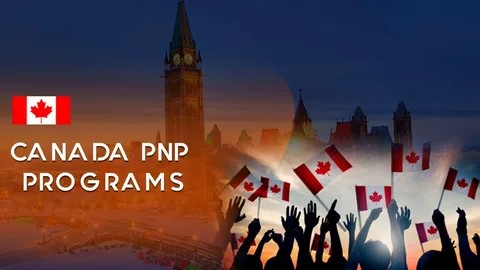The Provincial Nominee Program (PNP) of Canada is a system that allows individual provinces and territories to nominate immigrants who have the skills, experience, and qualifications needed in their specific regions for Canadian permanent residency. Here are key points about the PNP:
1. Provincial Control:
Each province and territory in Canada, except for Quebec, has its own Provincial Nominee Program (PNP) with unique streams and criteria. They can nominate candidates based on their specific economic, labor market, and demographic needs.
2. Employer-driven Streams:
Some Provincial Nominee Program streams are employer-driven and require a job offer from a Canadian employer in the nominating province or territory.
3. Regional and Community-specific Streams:
Certain provinces and territories have streams designed to attract immigrants to specific regions or communities within their jurisdictions, often in rural or less populated areas.
4. Minimum Requirements:
While requirements vary by province and stream, common criteria include education, work experience, language proficiency, and a genuine intention to settle in the nominating province or territory.
5. Nomination Certificate:
Once nominated by a province or territory, candidates receive a nomination certificate, which allows them to apply for permanent residency through Immigration, Refugees, and Citizenship Canada (IRCC).
6. Annual Quotas:
Provincial Nominee Program often have a set number of nominations they can issue each year. Popular streams may have competitive application processes.
7. Path to Permanent Residency:
A successful Provincial Nominee Program nomination leads to Canadian permanent residency, which provides the same rights and benefits as other Canadian citizens, including access to healthcare and social services.
8. Application Process:
Applicants typically need to follow a multi-step process that includes obtaining a provincial nomination, applying for permanent residency to the federal government, undergoing medical and security checks, and meeting other federal requirements.
9.Category-based Streams:
Other streams are categorized based on factors such as skilled workers, international graduates, entrepreneurs, and more. Applicants must meet specific criteria for the chosen category.
10.Express Entry-linked Streams:
Many PNPs are linked to the federal Express Entry system, which manages candidates’ profiles for three federal economic immigration programs: Federal Skilled Worker, Federal Skilled Trades, and Canadian Experience Class. Provincial nominations provide additional points and significantly boost an applicant’s chances in the Express Entry pool.
The PNP is an important avenue for skilled workers, entrepreneurs, and other immigration candidates to secure Canadian permanent residency, contribute to the local economy, and address specific labor market needs in different regions of the country. Each province and territory regularly updates its PNP streams and requirements, so candidates should regularly check the official websites for the most up-to-date information.
Requirements for Provincial Nominee Program (PNP)
The requirements for the Provincial Nominee Program (PNP) in Canada can vary significantly depending on the specific stream or category within the PNP that you are applying to. Each province and territory in Canada has its own PNP with its own set of eligibility criteria and application process. However, there are some common requirements that apply to many PNP streams. Here are key requirements:
1. Intention to Reside:
You must demonstrate a genuine intention to reside in the province or territory that is nominating you. This typically involves providing a settlement plan outlining your plans to live and work in the province.
2. Occupation and Work Experience:
Depending on the stream, you may need to have work experience in an occupation that is in demand in the nominating province or territory. Some PNPs have specific lists of eligible occupations.
3.Education:
You generally need to meet minimum education requirements. Some streams may require a certain level of education, such as a diploma, degree, or trade certification.
4. Language Proficiency:
Proficiency in English or French may be required, and you may need to provide language test results, such as IELTS or CELPIP for English or TEF for French.
5.Valid Job Offer (if applicable):
Many PNP streams require a valid job offer from an employer in the nominating province or territory. This offer may need to meet specific criteria, such as being in a certain occupation or meeting wage requirements.
6. Work Experience (if applicable):
Some streams require a minimum number of years of work experience in a relevant field. This experience is often related to the occupation for which you have a job offer.
7. Net Worth (for Entrepreneur Streams):
If you are applying through an entrepreneur or business stream, you may need to demonstrate a minimum net worth and a certain level of investment in a new or existing business in the province or territory.
8. Admissibility:
You must be admissible to Canada, which means you should not have any criminal or medical issues that would make you inadmissible.
9. Express Entry Eligibility (for Express Entry-linked streams):
If you are applying through an Express Entry-linked stream, you must also meet the eligibility criteria for one of the federal economic immigration programs (Federal Skilled Worker, Federal Skilled Trades, or Canadian Experience Class).
10.Settlement Funds:
You may need to show that you have sufficient funds to support yourself and your family members upon arrival in Canada, especially if you do not have a job offer.
It’s important to note that requirements can change, and different provinces and territories may have unique criteria. Therefore, it’s essential to consult the official website of the specific PNP you are interested in for the most up-to-date information and detailed guidelines. Additionally, consider seeking advice from an immigration consultant or lawyer who specializes in Canadian immigration to navigate the PNP application process effectively.

